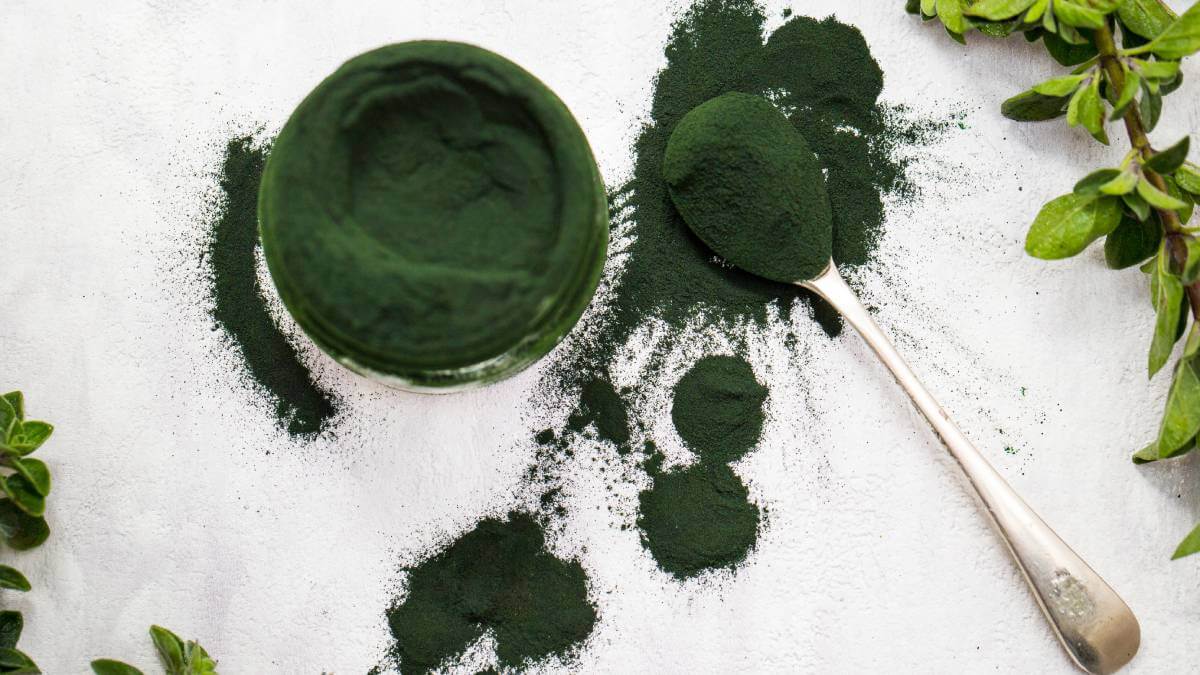Green powders are marketed as a convenient way to supplement your diet with a wide range of nutrients. They are sometimes called ‘superfood blends’ or ‘nutrient powders’ and typically contain nutrient-rich plants such as spirulina, chlorella, wheatgrass, kale and spinach.
They claim to offer many health benefits including improved energy, enhanced digestion, immunity support and improved gut health. You just mix a scoop of green powder with water or juice, or blend it into a smoothie to consume.
A number of wholesome elements make up your typical green powder, including dried or dehydrated vegetables and fruits, plant extracts and adaptogens. They are fortified with vitamins and minerals, and may even include probiotics, prebiotics and dietary fibre supplements. They are said to ‘fill nutritional gaps’ for individuals with suboptimal diets.
Australian dietary guidelines recommend that you consume a minimum of five servings of vegetables each day, with one serving being equal to 75g of raw, cooked, fresh or frozen vegetables. The average person should also consume a minimum of two servings of fruit per day, with one serving equal to 150g of fresh, frozen or canned fruit, or 30g of dried fruit. This amounts to almost 700g of combined fruit and vegies each day, and it’s a goal that many people don’t meet.
Can green powder replace fruits and veg?
Consuming green powder can be a helpful way to increase your intake of certain nutrients found in fruits and vegetables. However, there are a number of reasons why it should not replace whole fruits and vegetables in your diet, including:
Concentration of nutrients
Green powders are very concentrated sources of vitamins, minerals and antioxidants. But whole fruits and vegetables provide a wide range of phytonutrients and dietary fibre that green powders may lack.
The added probiotics, prebiotics and digestive enzymes claimed to improve gut health are attractive. Yet, gut health is very personal. Some individuals reap benefits from specific probiotics and prebiotics, while others encounter issues such as bloating and flatulence.
Fibre content
Fibre improves digestive health, helps you feel full and aids in regulating blood sugar levels. While some green powders may have added fibre, whole fruits and vegies contain more.
Also, some individuals are sensitive to prebiotic fibres and high-FODMAP components, such as inulin, that are used as a source of added fibre.
Lack of variety
Dietary guidelines emphasise the importance of a varied diet. Whole fruits and vegetables come in different colours and types, each offering a unique set of nutrients. Green powders may not capture the diversity of nutrients found in a balanced diet.
A large amount of added nutrients
When it comes to vitamins and minerals, more is not always better. Many green powders contain supplemental nutrients in doses higher than your body can absorb. Meaning your body can’t use them and they go to waste.
Another thing to consider is what nutrients the green powder contains. It’s common knowledge that vitamin C enhances the absorption of iron, but some nutrients can counteract each other. For instance, magnesium and calcium can hinder each other’s absorption if taken at the same time. Additionally, the inclusion of dietary fibre in these supplements may reduce the absorption of added minerals such as iron, zinc and calcium.
The body can more readily absorb nutrients found in whole foods as they contain natural combinations of nutrients that enhance their bioavailability. This is a distinct advantage of obtaining nutrients from whole food sources of fruits and vegetables.
Are green powders worth the money?
Popular food and health trends tend to be expensive and embracing a green lifestyle can be quite costly. At present, one of the most popular green powders on the market costs more than $28 per week. However, there is a wide range of products out there, some starting at $20 for 200g, which should be enough for one month’s use.
Overall, green powders can work in some circumstances. For example, if your diet lacks sufficient fruits and vegetables, a high-quality green powder can help bridge the nutrient gap and boost your overall health. If you’re always on the go or have a busy lifestyle that makes it challenging to prepare fresh greens, green powders can offer a quick and easy solution. Also, if you have specific health concerns or goals, such as detoxification support or increasing your antioxidant intake, choosing a green powder with the right ingredients may be beneficial.
Remember, not all green powders are equal. Look for reputable brands that use high-quality, organic ingredients and have undergone third-party testing for purity and potency.
What do you think of green powders? Are they a hero or a hoax? Why not share your thoughts in the comments section below?
Also read: Quick facts about the green powerhouse that is matcha
Disclaimer: This article contains general information about health issues and is not advice. For health advice, consult your medical practitioner.

